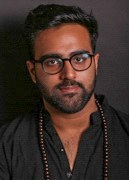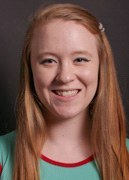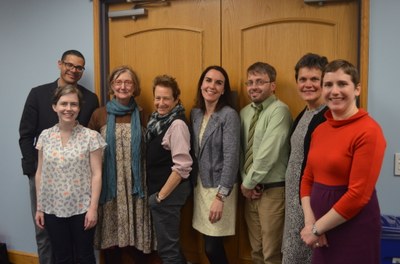“Fairly Unusual” BA/MA Program Attracts Those with a Passion for Writing

People often associate English departments with faculty and students who study, teach, and write about literature. Indeed, a great many of the pieces in the CALS “News” blog are responsive to one or more aspects of that phenomenon. However, there is another side of the “literary” coin, which involves those who actually produce literature. Penn State’s now eight-year-old BA/MA (Bachelor of Arts/Master of Arts) Program in Creative Writing fosters just such students. The website for the program states that it is “an integrated undergraduate/graduate degree in English with a creative writing concentration in Poetry and in Prose (fiction and creative nonfiction),” and that it “place[s] a special emphasis on mentoring writers who are polishing their portfolios for eventual application to outside M.F.A. programs.” Indeed, many students do intend to go on to an M.F.A. (Master of Fine Arts) program to continue writing or potentially to teach.
With a March application deadline for new students, the program is “fairly unusual,” according to Director of Creative Writing Charlotte Holmes, and its application process attracts students who are passionate about their craft.
Some students enter Penn State with a passion for writing. Sarah Williams, a second-year M.A. in the program, says that she “always intended to be a writer” and that the BA/MA program was “the perfect opportunity.”
Other students such as Trae Hawkins, a senior in the BA/MA program, enter the program according to a less predetermined pathway. Hawkins said he only switched from Political Science to the English major at the end of his sophomore year after two different professors had mentioned it to him.

“After I decided to major in English I thought, ‘well what am I going to do with it?’ and I thought maybe I could be a teacher.”
Hawkins then decided that the convenient one-year M.A. offered through the BA/MA program would be the right fit for his career path.
Nakul Grover, a second-year M.A. in the program and recipient of the 2020 Ardeth and Norman Frisbey International Student Award in recognition of “outstanding contributions to international understanding by graduate/undergraduate international students,” shared a similar story about how he switched into the English major only after taking a general education poetry course his sophomore year.
“I realized that writing made me happy on a spiritual level. I had no intentions of being an English major and had not studied creative writing before, but workshop after workshop, I realized that I wanted to play around with all forms and genres.”
Like Grover, students tend to like the program once they enroll in it. Holmes pointed to the many benefits of the program, including that students can get an advanced degree without relocating and that the funding for accepted students is guaranteed. Also, the annual Mary E. Rolling Reading Series brings to Penn State a range of nationally recognized authors (including this year’s Centre County Reads author and National Book Award winner Alice McDermott) and early career writers, and the writer-in-residency program allows students to spend a week working closely with a writer outside the core faculty.

- Nakul Grover, 2nd-year M.A.
This year’s writer-in-residence is Walter Kirn. "We can send him something we’ve written and he’s going to read it and he’ll have hour-long talks with each one of us to tell us what’s good, what’s bad, how to improve on it,” said Hawkins. “Something like that is so valuable.”
The program is also highly flexible, allowing students a wide range in terms of what kind of writing they can do. Students reported writing on topics as diverse as Pennsylvania coal towns, climate change, migration, and high fantasy war stories. That the program also offers courses in fiction, poetry, and non-fiction prose is also a valuable benefit. Grover stated that if there was one thing he would change about the program, it would be to require students to take classes in all these genres, as they each teach “great techniques” that students can incorporate into whatever their main writing area happens to be. Williams shared a similar sentiment, suggesting she would be excited to see the program implement designated “writing hours” in which students could gather in a common area and work on their writing together for a regularly scheduled set period of time.
“It would also build a sense of community, especially since we don't always see people who are focused in a different discipline (poetry vs. fiction, for example).”

- Sarah Williams, 2nd-year M.A.
It is clear that BA/MA students have passion for what they do, but what do they plan to do with that passion? For many, the answer lies in continuing their education. Williams, Grover and Hawkins all said that they plan to go on to either an M.F.A. or a Ph.D. program, and Hawkins says that, ideally, he’d like to teach creative writing. All plan to continue writing.
“Many of our students have gone on to study in MFA programs across the country,” said Holmes, “and they invariably report back that they are among the best prepared students in their programs because they've already had a year of graduate school and teaching under their belts. The BA/MA students learn how to be graduate students in a supportive environment, working with teaching writers they already know. I'm proud that we can give our students that advantage.”
Sydney Doyle, an alumna of the BA/MA program who went on to an MFA at Johns Hopkins and is currently a doctoral fellow at the University of Louisiana at Lafayette, echoed Holmes’s statements.

- Charlotte Holmes, Director of Creative Writing
“With the aid of my phenomenal professors and mentors within the BA/MA program, the quality of my writing grew astronomically within the span of two years,” said Doyle. “I had originally planned to apply to MFAs directly after graduating with my BA, but I am absolutely certain that without the BA/MA program I would not have been accepted anywhere, let alone seven fully-funded programs. My professors worked tirelessly during my application process by editing my manuscript, writing countless letters of recommendation, and providing me with information on individual programs.”
While they may not always be the first people to come to mind when we think about graduate students in an English department, that does not mean that creative writing students are any less valuable to our thinking about literature. In fact, without creative writers, literature as we know it would cease. Seeing how passionate and dedicated these students are to the craft of writing should inspire a sense of shared optimism, as the potential of literature is only unlocked by the merging of those who care deeply about writing with those who value the text as a cultural object.

- In 2015, five Penn State alumnae visited campus to read from their award-winning poetry books. From left: Geffrey Davis (participant of First Book Fest '15), Sarah Blake (participant of First Book Fest '15), Charlotte Holmes (Director of Creative Writing), Robin Becker (Liberal Arts Research Professor Emeritus of English and Women's Studies), Rachel Mennies (participant of First Book Fest '15), William Woolfitt (participant of First Book Fest '15), Julia Kasdorf (Professor of English and Women's, Gender and Sexuality Studies), and Katherine Bode-Lang (participant of First Book Fest '15).

People often associate English departments with faculty and students who study, teach, and write about literature. Indeed, a great many of the pieces in the CALS “News” blog are responsive to one or more aspects of that phenomenon. However, there is another side of the “literary” coin, which involves those who actually produce literature. Penn State’s now eight-year-old BA/MA (Bachelor of Arts/Master of Arts) Program in Creative Writing fosters just such students. The website for the program states that it is “an integrated undergraduate/graduate degree in English with a creative writing concentration in Poetry and in Prose (fiction and creative nonfiction),” and that it “place[s] a special emphasis on mentoring writers who are polishing their portfolios for eventual application to outside M.F.A. programs.” Indeed, many students do intend to go on to an M.F.A. (Master of Fine Arts) program to continue writing or potentially to teach.
With a March application deadline for new students, the program is “fairly unusual,” according to Director of Creative Writing Charlotte Holmes, and its application process attracts students who are passionate about their craft.
Some students enter Penn State with a passion for writing. Sarah Williams, a second-year M.A. in the program, says that she “always intended to be a writer” and that the BA/MA program was “the perfect opportunity.”
Other students such as Trae Hawkins, a senior in the BA/MA program, enter the program according to a less predetermined pathway. Hawkins said he only switched from Political Science to the English major at the end of his sophomore year after two different professors had mentioned it to him.

“After I decided to major in English I thought, ‘well what am I going to do with it?’ and I thought maybe I could be a teacher.”
Hawkins then decided that the convenient one-year M.A. offered through the BA/MA program would be the right fit for his career path.
Nakul Grover, a second-year M.A. in the program and recipient of the 2020 Ardeth and Norman Frisbey International Student Award in recognition of “outstanding contributions to international understanding by graduate/undergraduate international students,” shared a similar story about how he switched into the English major only after taking a general education poetry course his sophomore year.
“I realized that writing made me happy on a spiritual level. I had no intentions of being an English major and had not studied creative writing before, but workshop after workshop, I realized that I wanted to play around with all forms and genres.”
Like Grover, students tend to like the program once they enroll in it. Holmes pointed to the many benefits of the program, including that students can get an advanced degree without relocating and that the funding for accepted students is guaranteed. Also, the annual Mary E. Rolling Reading Series brings to Penn State a range of nationally recognized authors (including this year’s Centre County Reads author and National Book Award winner Alice McDermott) and early career writers, and the writer-in-residency program allows students to spend a week working closely with a writer outside the core faculty.

- Nakul Grover, 2nd-year M.A.
This year’s writer-in-residence is Walter Kirn. "We can send him something we’ve written and he’s going to read it and he’ll have hour-long talks with each one of us to tell us what’s good, what’s bad, how to improve on it,” said Hawkins. “Something like that is so valuable.”
The program is also highly flexible, allowing students a wide range in terms of what kind of writing they can do. Students reported writing on topics as diverse as Pennsylvania coal towns, climate change, migration, and high fantasy war stories. That the program also offers courses in fiction, poetry, and non-fiction prose is also a valuable benefit. Grover stated that if there was one thing he would change about the program, it would be to require students to take classes in all these genres, as they each teach “great techniques” that students can incorporate into whatever their main writing area happens to be. Williams shared a similar sentiment, suggesting she would be excited to see the program implement designated “writing hours” in which students could gather in a common area and work on their writing together for a regularly scheduled set period of time.
“It would also build a sense of community, especially since we don't always see people who are focused in a different discipline (poetry vs. fiction, for example).”

- Sarah Williams, 2nd-year M.A.
It is clear that BA/MA students have passion for what they do, but what do they plan to do with that passion? For many, the answer lies in continuing their education. Williams, Grover and Hawkins all said that they plan to go on to either an M.F.A. or a Ph.D. program, and Hawkins says that, ideally, he’d like to teach creative writing. All plan to continue writing.
“Many of our students have gone on to study in MFA programs across the country,” said Holmes, “and they invariably report back that they are among the best prepared students in their programs because they've already had a year of graduate school and teaching under their belts. The BA/MA students learn how to be graduate students in a supportive environment, working with teaching writers they already know. I'm proud that we can give our students that advantage.”
Sydney Doyle, an alumna of the BA/MA program who went on to an MFA at Johns Hopkins and is currently a doctoral fellow at the University of Louisiana at Lafayette, echoed Holmes’s statements.

- Charlotte Holmes, Director of Creative Writing
“With the aid of my phenomenal professors and mentors within the BA/MA program, the quality of my writing grew astronomically within the span of two years,” said Doyle. “I had originally planned to apply to MFAs directly after graduating with my BA, but I am absolutely certain that without the BA/MA program I would not have been accepted anywhere, let alone seven fully-funded programs. My professors worked tirelessly during my application process by editing my manuscript, writing countless letters of recommendation, and providing me with information on individual programs.”
While they may not always be the first people to come to mind when we think about graduate students in an English department, that does not mean that creative writing students are any less valuable to our thinking about literature. In fact, without creative writers, literature as we know it would cease. Seeing how passionate and dedicated these students are to the craft of writing should inspire a sense of shared optimism, as the potential of literature is only unlocked by the merging of those who care deeply about writing with those who value the text as a cultural object.

- In 2015, five Penn State alumnae visited campus to read from their award-winning poetry books. From left: Geffrey Davis (participant of First Book Fest '15), Sarah Blake (participant of First Book Fest '15), Charlotte Holmes (Director of Creative Writing), Robin Becker (Liberal Arts Research Professor Emeritus of English and Women's Studies), Rachel Mennies (participant of First Book Fest '15), William Woolfitt (participant of First Book Fest '15), Julia Kasdorf (Professor of English and Women's, Gender and Sexuality Studies), and Katherine Bode-Lang (participant of First Book Fest '15).